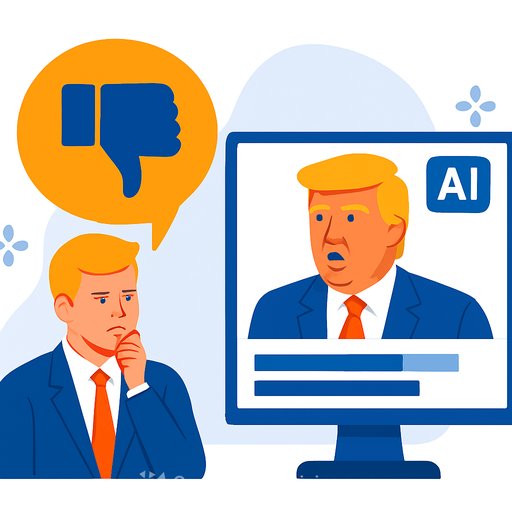Survey: Most Americans Disapprove of President Trump's AI Videos - What Government Professionals Should Note
A new YouGov survey finds a broad negative reaction to President Trump's AI-generated videos tied to the recent government shutdown. Seventy percent of respondents strongly or somewhat disapprove of the clip showing him in a fighter jet dropping brown sludge on demonstrators at the "No Kings" protest in New York City. Twenty percent approve, and 10 percent are unsure.
Reactions to that post skewed heavily negative on tone and appropriateness. Sixty percent called it unpresidential, 52 percent said it was disturbing, and 51 percent found it offensive. Twenty-one percent described it as funny.
Respondents also largely disapproved of two other AI videos shared by the president: one depicting former President Obama being arrested in the Oval Office, and another showing the Gaza Strip with a gold Trump statue and a Trump-branded hotel.
Trump has continued to post provocative AI content, including a video portraying House Minority Leader Hakeem Jeffries with a sombrero and mustache next to Senate Minority Leader Chuck Schumer on White House grounds during the shutdown. "Hours away from a shutdown, which we don't want, the American people don't want, the president is busy trolling away on the internet like 10-year-old," Schumer said on the Senate floor. Republican lawmakers have characterized the posts as "jest" and "satire."
Beyond the specific posts, Americans express broad concern about AI's political uses. Eighty-five percent are at least somewhat worried about political propaganda spread through AI. Ninety percent are concerned about misleading content or deepfakes. Small minorities report no concern or uncertainty.
YouGov surveyed 1,091 citizens from Oct. 20-22, with a margin of error of ±4.1 percentage points. Methodology details are available from YouGov's panel documentation. View methodology
Implications for Government Communicators
- Public tolerance for AI "satire" is low. The 70 percent disapproval suggests official or quasi-official channels using AI for ridicule will likely backfire. Set clear standards for content tone, especially during sensitive periods like shutdowns.
- Strengthen misinformation protocols. With 90 percent worried about deepfakes, reinforce monitoring, rapid response, and corrective messaging plans. Equip press and digital teams with a clear playbook for synthetic media claims. CISA guidance on synthetic media
- Labeling and context matter. If AI or edited media is used in official communications, include clear disclosures and archive versions to prevent misattribution or confusion.
- Records and ethics compliance. Confirm how AI-generated posts are archived under records policies, and ensure staff understand boundaries on political content, especially on accounts linked to official duties.
- Train your team. Short, role-specific training helps staff spot manipulated content and respond consistently across agencies and offices. If your office is building AI literacy, see practical options by role at Complete AI Training.
Bottom line: public sentiment is signaling a limit. For government professionals, that means tighter guardrails on AI content, faster verification workflows, and messaging discipline when emotions are high and facts are fluid.
Your membership also unlocks:






